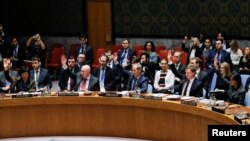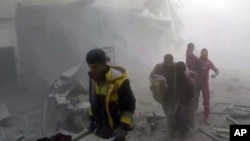The U.N. Security Council unanimously demanded Saturday that all parties in Syria implement a nationwide cease-fire for at least 30 days and lift sieges on areas, including eastern Ghouta.
Council unity came after days of intense and difficult negotiations to find language that Russia would support. Those efforts, guided by the drafters of the resolution, Sweden and Kuwait, continued until the final moments before the vote.
"We are convinced that this resolution cannot end humanitarian suffering in Syria immediately. However, it is a positive sign sent by the Security Council," Kuwaiti Ambassador Mansour al-Otaibi said. "Now, we must implement this resolution."
The resolution demands that all parties cease hostilities "without delay" for at least 30 consecutive days to allow humanitarian aid to be delivered and to evacuate the critically ill and injured. The truce does not apply to terrorist groups, including Islamic State, the Nusra Front or al-Qaida.
U.S. Ambassador Nikki Haley expressed her skepticism that the Syrian government would comply with the cease-fire, but said the truce must be given a chance to work. She also admonished the Russians for stalling the resolution's adoption.
"Every minute this council waited on Russia, the human suffering grew," Haley said. "In the three days it took us to adopt this resolution, how many mothers lost their kids to the bombing and shelling?"
Russian objections
Plans to vote earlier in the week were repeatedly abandoned because of Russia's continued objections to elements of the text. Rather than lose the cease-fire to a veto, the negotiations dragged on in search of consensus.
Concessions were made to the Russians on the timing of when the cease-fire would go into effect ("without delay" as opposed to the initial "within 72 hours"), and aid deliveries and medical evacuations will not happen "48 hours" after the cessation of hostilities as the drafters envisaged, but "immediately" after.
Russian envoy Vassily Nebenzia said the negotiations were lengthy because his delegation did not think the cease-fire rollout was feasible as originally proposed.
"Directives or instructions without any concrete agreement for the warring parties in Syria cannot arrive at a cease-fire," he told council members. "This kind of an unrealistic approach will in no way help address the pressing humanitarian situation in Syria."
He said it was necessary for Security Council demands to be "underpinned by concrete on-the-ground agreements."
U.N. Secretary-General António Guterres, who this week said the 400,000 inhabitants of eastern Ghouta were living in a "hell on Earth," was pleased with the unanimous adoption.
"I welcome the Security Council's resolution on a cease-fire in Syria and call for all sides to allow the immediate delivery of humanitarian aid," he wrote on Twitter.
'Glimmer of hope'
"Today's resolution offers a glimmer of hope to civilians trapped inside besieged eastern Ghouta, but only if it is enforced," said Fadel Abdul Ghany, chairman of the Syrian Network for Human Rights. "As we saw in Aleppo and Homs before it, left to its own devices, the Assad regime will continue its bloodbath until it has starved, bombed, displaced and killed every last Syrian who dares to dream of freedom and dignity."
Others urged the Security Council to be vigilant in enforcing its decision.
"This means articulating clear, meaningful consequences for any party that violates the 30-day truce, and introducing a credible timetable to turn the temporary truce into long-term de-escalation, so that parties are in a position to negotiate a lasting political solution," said Ibrahim al-Assil, president of the Syrian Nonviolence Movement.
Meanwhile, the Associated Press reported that a new wave of airstrikes and shelling Saturday on eastern Ghouta left at least five people dead and more than a dozen wounded, raising the death toll of a week of bombing in the area to nearly 500, including scores of women and children.
Fighting has escalated there, as the Syrian military and its allied forces appear to be launching an all-out operation to retake the district, which is one of the last near Damascus still under control of the armed opposition.














